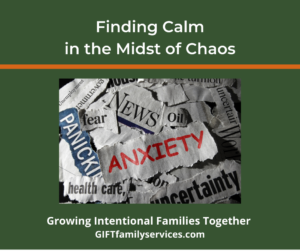 Lately, I have been feeling unsettled by current events. I suspect I am not alone. Parents and children are feeling the weight of these issues. School shootings. Droughts. Floods. Deadly viruses. Extreme political discord. And an increasing difficulty trying to identify truth from misinformation and disinformation. This can discourage even the most positive-minded folks leaving them feeling powerless and overwhelmed.
Lately, I have been feeling unsettled by current events. I suspect I am not alone. Parents and children are feeling the weight of these issues. School shootings. Droughts. Floods. Deadly viruses. Extreme political discord. And an increasing difficulty trying to identify truth from misinformation and disinformation. This can discourage even the most positive-minded folks leaving them feeling powerless and overwhelmed.
In the midst of this chaos, we wonder how we can find calm–for ourselves and our children. Responding with action grounds us and eases hopelessness. It also steadies us so we can support our children better. We can take action in many arenas and in many ways.
I am a parent and a grandmother in addition to being a coach to adoptive families. I find it useful to drill down from the Big Picture and launch into action in my own sphere and do what I can in my own community and state and then move outward.
Responding with action grounds us and eases hopelessness.
It also steadies us so we can support our children better. For example, in our own families, we can lower the emotional thermostat of conversations in general. Current events have us on edge and fearful. This can cause us to be hypervigilant or overreactive. Recently I saw a meme from –@The_Therapist_Parent that said, “Children and adults really aren’t that different when it comes to stress triggers. Nobody copes well when they are tired, hungry, overwhelmed, or feeling controlled.”
I know this to be true. It is wise for us to remember to pause and think about our responses before they erupt from our mouths. Ask ourselves some questions. Are we overwrought or can we engage effectively? Can we be curious about what is provoking the behavior or situation at this moment? Or, should we handle it later when we are feeling calm? (And, if you decide to defer it until later, be sure that the conversation or intervention does happen in a timely manner.) Once we’re in a responsive frame of mind, we can determine what action we want to take.
Taking action in our own families
How can we strive to maximize the quality of our parent/child relationship and minimize relationship fracture? It is a truism that it is impossible to share entirely conflict-free family relationships. However, we can commit to bringing a firm intentionality to avoid toxic interactions.
We can commit to treating our children with respect. This makes sense because the best way for children to learn to be respectful is for them to experience respect –especially from us. We want to avoid confusing parental responsibility as carte blanche for being overly authoritative and domineering. Strive to discipline only when in a calm state rather than in the heat of anger.
As I previously said, all relationships experience conflict and frustration. Parents can choose to ignore them or address these breakdowns and engage in repair practices. Research has proven that children learn how to repair relationships when their parents apologize and engage in other repair practices with them. We show them the value of intentionally reaching for calm in their own interactions with family and friends by our example. This helps children develop a stronger sense of Emotional Intelligence, a skill that will serve them throughout their lives in personal. school, and work relationships.
Failure is as unavoidable as conflict. Embrace it!
Children are works in progress. They learn by trial and error. No one –adult or child–is successful 100% of the time. So, we want to teach children not to fear failure but rather to see it as a learning opportunity.
Keep in mind that struggling with mastery is one of the seven core issues of adoption (loss, rejection, guilt and shame, identity, intimacy, mastery and self-control, and grief.) Fear of failure is tied to fear of rejection which is another of the seven core issues.
Children who never fail are children who never try or never stretch their skill sets. Fear of failure limits them–and us –if we let it. Only by risking failure can they expand their competency. (That’s true for us as well!)
Help children develop courage
As parents, we want to help them learn to be okay with the discomfort of tackling hard things, of trying them again and again until they finally achieve mastery. The discomfort of being an unskilled beginner is temporary, not terminal. If they fall apart at the first sense of discomfort, they will never move beyond their comfort zone. And their comfort zone will remain confining and small. Growth occurs only at the edges of one’s comfort zone. So it is important for us to help them to learn to be comfortable with the discomfort of being a beginner.
As parents, we can serve as an example of having the courage to be a beginner. We can allow them to observe our own struggles with failure and frustration, persistence and determination, as we journey the winding road to mastery in our own lives.
As always, we welcome your requests for future blog topics.
To learn more about Child Abuse Prevention Month which is observed in April click this link from Child Welfare.gov
__________________________
- Call us at 1-800-653-9445
- Listen to our podcasts: Adoption Matters: Real People. Real Life. Real Talk and Essentials of Adoption Attuned Parenting
- Watch our YouTube channel
- Read Books written by our coaches
- Click to learn more about Adoption Attuned Certified coaching!
- Check out our on-demand courses.


